
Journey is an American rock band formed in San Francisco in 1973 by former members of Santana, the Steve Miller Band, and Frumious Bandersnatch. The band as of 2021 consists of guitarist/vocalist Neal Schon, keyboardist/guitarist/vocalist Jonathan Cain and keyboardist/vocalist Jason Derlatka, drummer/vocalist Deen Castronovo, bassist Todd Jensen, and lead vocalist Arnel Pineda.

"Letting Go" is a song credited to Paul and Linda McCartney and originally released by Wings on their 1975 album Venus and Mars. The song was remixed and released as a single on 4 October 1975 in the United States, and on 18 October 1975 in the United Kingdom. The song peaked at number 41 in the UK, 41 on the Cash Box Top 100 and number 39 on the Billboard Hot 100.

"Why Me" is a song written by Dennis DeYoung that was first released on Styx's 1979 double-platinum album Cornerstone. It was also released as the second single from the album, and reached #26 on the Billboard Hot 100 and #10 on the Canada RPM Top 100 Singles chart.

"Feels Like the First Time" is the debut single by British-American rock band Foreigner. It was written by Mick Jones and released in 1977 from the band's eponymous debut album. It reached No. 4 on the Billboard Hot 100.

"The Voice" is the second single released from the Moody Blues' 1981 album Long Distance Voyager. The song continued the success of previous single "Gemini Dream", becoming a Top 40 hit on the Billboard Hot 100, where it peaked at No. 15 in October 1981. The song had previously topped the Billboard Top Rock Tracks chart for four weeks during June–July 1981. The song also reached No. 9 in Canada.
"Hangman Jury" is a song by American rock band Aerosmith. It was released as a promotional single in 1987 on the album Permanent Vacation. It was written by lead singer Steven Tyler, guitarist Joe Perry, and outside collaborator Jim Vallance. In contrast with the rest of the album which contains highly polished glam metal, the song is a mostly blues song. The chorus has a close similarity to "Linin' Track" by Lead Belly.

"Ride My See-Saw" is a 1968 single by the English progressive rock band the Moody Blues. It was written by the band's bassist John Lodge, and was first released on the Moody Blues' 1968 album In Search of the Lost Chord. It was the second of two singles from that album, the other being "Voices in the Sky".

"Tuesday Afternoon" is a 1968 song written by Justin Hayward that was first released by English rock band the Moody Blues on their 1967 album Days of Future Passed and later released as a single.
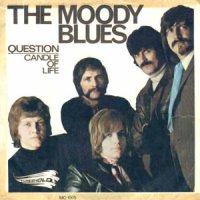
"Question" is a 1970 single by the English progressive rock band the Moody Blues. It was written by guitarist Justin Hayward, who provides lead vocals. "Question" was first released as a single in April 1970 and remains their second highest-charting song in the UK, reaching number two and staying on the chart for 12 weeks. The song reached number 21 on the Billboard Top 40 in the USA. It was later featured as the lead track on the 1970 album A Question of Balance. The single also features the song "Candle of Life" on its B-side, which was from the Moody Blues' previous album To Our Children's Children's Children.
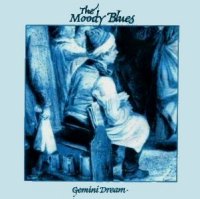
"Gemini Dream" is a 1981 single by the progressive rock band The Moody Blues. It reached number 12 on the US Hot 100, as well as number 1 on the Canada RPM Top 100 Singles chart. It is ranked as the 28th biggest Canadian hit of 1981.
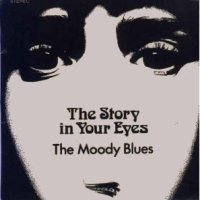
"The Story in Your Eyes" is a 1971 hit single by the English rock band the Moody Blues. Written by the band's guitarist Justin Hayward, it was first released as a single with "My Song" on the B-side, and then on the 1971 album Every Good Boy Deserves Favour shortly after.
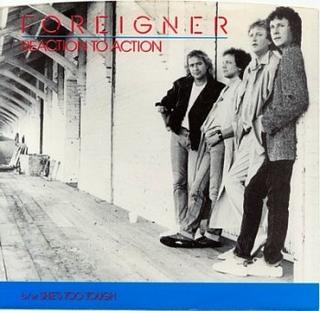
"Reaction to Action" is the third single taken from the album Agent Provocateur by the band Foreigner. It was written by Lou Gramm and Mick Jones.

"Down on Love" is the fourth single taken from the album Agent Provocateur by the band Foreigner, and released in August 1985.

"Boat on the River" is a 1979 song by Styx, from their album Cornerstone. It was released as a single in 1980 in various countries, but not in the band's native United States, where "Borrowed Time" was released instead.

"Gimme Some Slack" is a song by the American rock band the Cars from the album Panorama. The song was written by bandleader Ric Ocasek.

"Since You're Gone" is a song by the American rock band the Cars. It was released as the second single from their fourth album, Shake It Up.
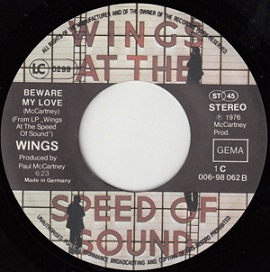
"Beware My Love" is a rock song credited to Paul and Linda McCartney that was first released on the Wings 1976 album Wings at the Speed of Sound. It was also used as the B-side of the single that included "Let 'Em In". A live version recorded on June 7, 1976, in Denver, Colorado, was included on the Wings' album Wings Over America and another live version from three days later in Seattle, Washington, was shown in the concert film Rockshow. An excerpt from the Rockshow performance was also included in the documentary Wings Over the World.

"Tonight" is a song by Raspberries, released in August 1973. It was written by band leader Eric Carmen, who also provided the lead vocals. The song was the first of three single releases from their third LP, Side 3.
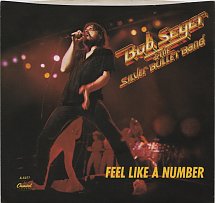
"Feel Like a Number" is a song written by Bob Seger that was first released on his 1978 album with the Silver Bullet Band, Stranger in Town. It was also released as the B-side of the top 5 single "Still the Same" and a live version from the album Nine Tonight was released as a single in 1981. The song was featured in the 1981 movie Body Heat.
"4% Pantomime" is a song written by Robbie Robertson and Van Morrison. It was first released on the Band's 1971 album Cahoots.
















